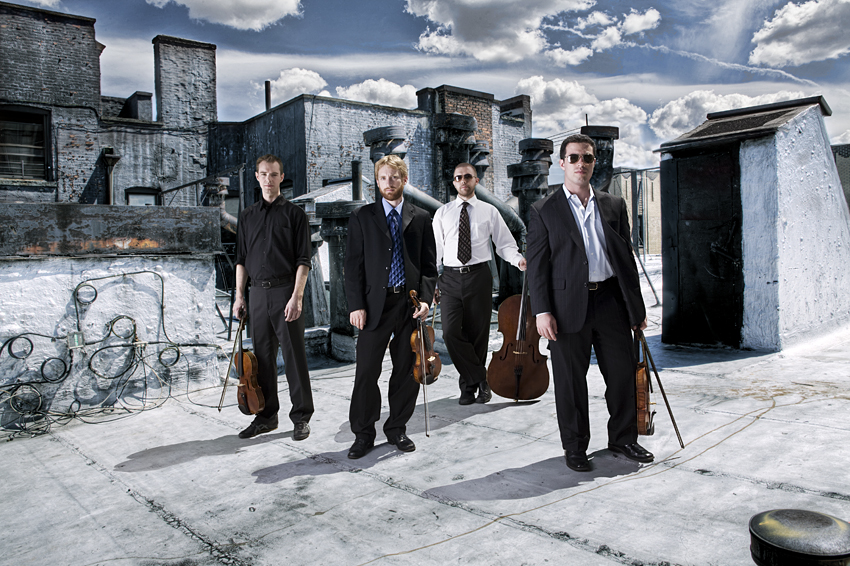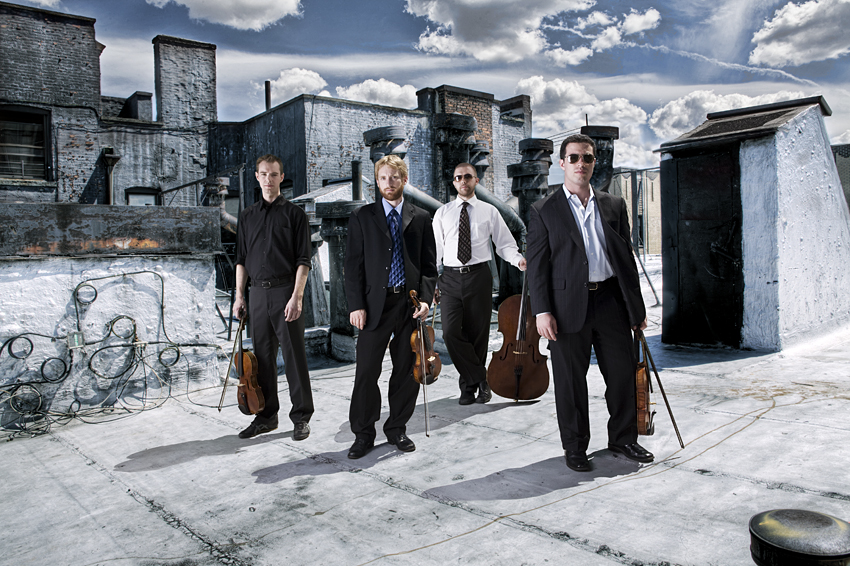
An impoverished existence

JACK Quartet. Photo: Justin Bernhaut
21–30 January 2011
Various venues, Berlin
Academy of St Martin in the Fields, Renaud Capuçon (violin, director)
28 January 2011
Konzerthaus, Berlin
In my destroyed life, my family is all that is left, the last and final ray of light… My life’s work is destroyed, the German opera smashed into pieces, German music banished to the Inferno, where her tortured soul lives out an impoverished, wailing existence. My beautiful Viennese house, of which I was so proud, now lies in soot and ashes – I will never again hear and see my works in this world – I wished that Mozart and Schubert had taken me with them to Elysium after my eightieth birthday…
Richard Strauss, 24 November 1944
Nearly a fortnight has passed since the end of Ultraschall, one of three major annual festivals of new music in Berlin. And my exasperation has barely waned. It was a difficult week of music; not because the music was challenging, but because it showcased in barest terms a troubling attitude that seems prevalent in German musical culture.
An on-stage conversation in the closing concert of the festival captured the problem in a few, awkward lines. Dr Margarete Zander, one of the two festival programmers, was interviewing the Dutch composer Richard Rijnvos before the performance of his Union Square Dance (2008) by the Deutsches Symphonie Orchester. Referring, presumably, to the work’s tonal harmony, and repetitive use of material, she asked him was this a work of provocation. ‘No,’ replied Rijnvos resolutely. ‘I have only one rule in composition: only ever write notes on the page that you want to hear.’ As if to correct the composer in his own thinking, the work was promptly reintroduced as the ‘provocative’ Union Square Dance.
To me, it appears to be an attitude to music which denies that music is sometimes simply experience alone without necessarily advancing an intellectual discourse. Rijnvos’ work could not be simply enjoyed for what it is – it must be provocation of something else, an antithesis. For it to be a sincere statement is not an option.
This demand for discourse, even in lieu of experience, is what I found so troubling about the music I heard at Ultraschall. I couldn’t engage with so much of what I heard, and often it felt as if it had no interest in having me engaged. Pieces were characteristically too long, structureless and full of half-begun ideas. I rarely long for a piece of music to end, but there were moments when the hyperactivity of a piece was so oppressive that I simply wished I was elsewhere. Simon Steen-Andersen’s Besides (2003), with one player’s whammy-pedal aimlessly redistributing the sound of the ensemble to speakers; John McGuire’s hour-long Forty-eight Variations for two Pianos (1982) was certainly focused – it’s of an older vintage when concentration mattered, but became tedious when it became too proud of the process it was trying desperately to complete; what I heard of ensemble recherche’s Liebeslieder programme seemed to forget that love songs can be seductive, or indeed might use a singer; the countertenor in Martin Schüttler’s schöner leben 1 (music for k.c.) (2008) briefly donned a blonde wig, as if in desperation to do something interesting; my patience ended when Christoph Ogiermann, unfortunately placed at the end of a marathon double concert, indulged in the gimmickry of having the pianist playing with his nose in his wRuKi 3 (2010), and then, to my horror, repeating most of the piece…
There were exceptions, of course, and I could go to only about half the concerts in the week-long festival. Christopher Fox’s drift + drag (2009-2010), premiered by Kammerensemble Neuer Musik Berlin on the festival’s opening night showed the first glimse of an alternative. Fox’s music so often seems to be a quietly stated allegory for a human experience, probably without trying to be. At Crash Ensemble’s first performance of Extended Play (2009) in Dublin, I couldn’t help thinking that the piece was suggesting that life was a game full of little melodies that come and go, often trivial, but amounting to a greater importance (or not). In drift + drag there is a central line pushing the music forward, with other material falling ahead or behind, moving in and out of rhythmic unity; to me it said, more subtly than any self-help book could, that it’s the little complications – the ‘erosion’, ‘turbulence’ and ‘sediment’ to steal from Fox’s geologically worded programme note – that define life, and often make it beautiful. Jennifer Walshe’s i. same person / ii. not the same person, which she performed herself with ensemble mosaik, also hit me squarely in the sternum. Combining Walshe’s voice, a psaltery, sustained strings, loud sine tones and recordings of breaking glass, it’s an extremely disturbing thing to witness – with Walshe at one point playing the part, one presumes, of a person being tortured. It’s gripping from start to finish, and you hear that everything is considered almost with a traditional composer’s ear, with a strong sense of structure and, oddly, harmony.
There were cases, too, where the performances rather than the writing was so persuasive that the music was made convincing by default; I would have switched off during Matthias Pintscher’s string quartet Study IV for treatise on the Veil (2009), but the JACK Quartet’s muscular playing made every moment vital. And at other times the playing was so perfect as to be clinical. Louis Andriessen’s Worker’s Union, in which only the rhythm and contour of the music is notated, thrives off violent, gutsy, even inaccurate performances; KNM Berlin’s playing of it was, as a friend described it, like driving a BMW.
German musicians, I have found, are very comfortable with a clear division of music into ‘ernste Musik’ (serious music) and ‘Unterhaltungsmusik’ (entertainment music). Here at the pinnacle of ernste Musik I was left longing for music that was truly serious, music which believed in itself enough to see an idea through, music which has something to say to an audience.
By Friday, exhausted and looking for an escape, I booked last minute tickets to the Academy of St Martin in the Fields at the Konzerthaus. On the programme was Richard Strauss’ Metamorphosen for 23 solo strings, a piece that was new to me and a revelation. Written at the end of Strauss’ life, and very shortly before the Second World War was to end in Europe, it is palpably among an old man’s final endeavours, a late attempt to make something beautiful amidst the most bitter adversity. Everything comes from this music’s seriousness, its total conviction in itself: the long-range lines of counterpoint, a kind of evolving but focussed formlessness, a sense of continuing at all costs. In half an hour of music, it barely lets you breathe. Here was, I thought, music that is profoundly a matter of life and death.
Benedict Schlepper-Connolly
Published on 11 February 2011









